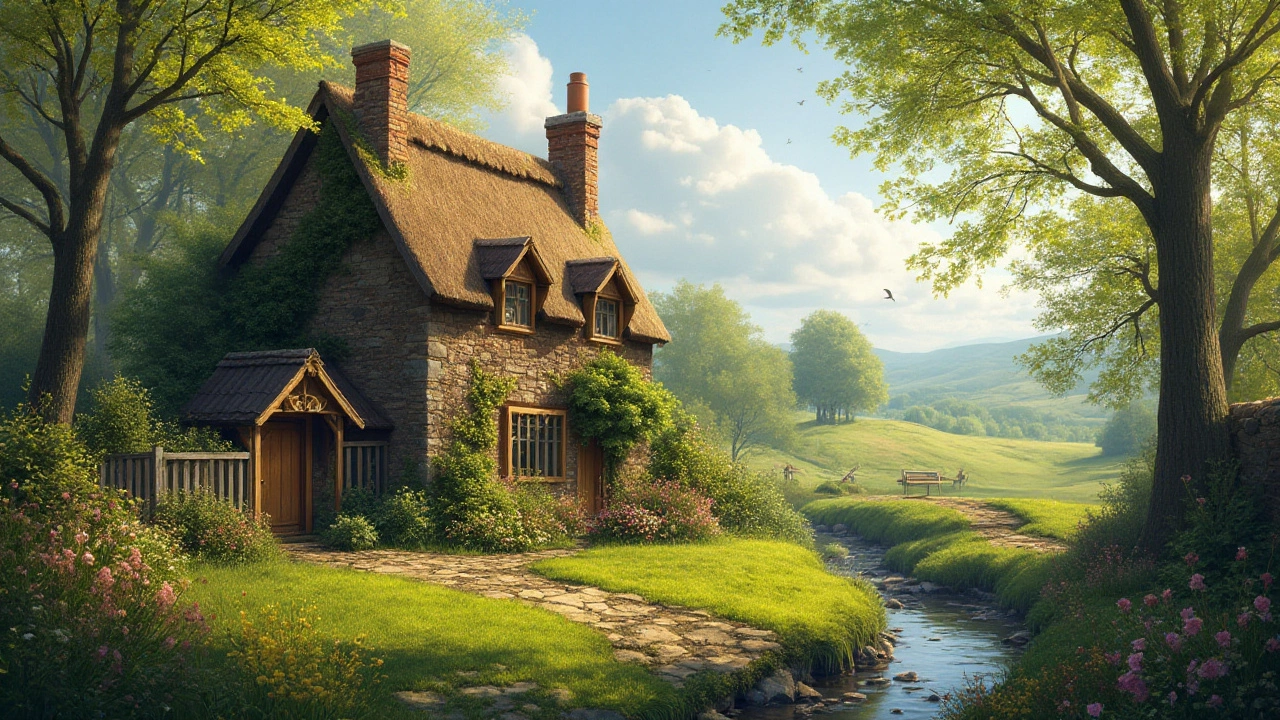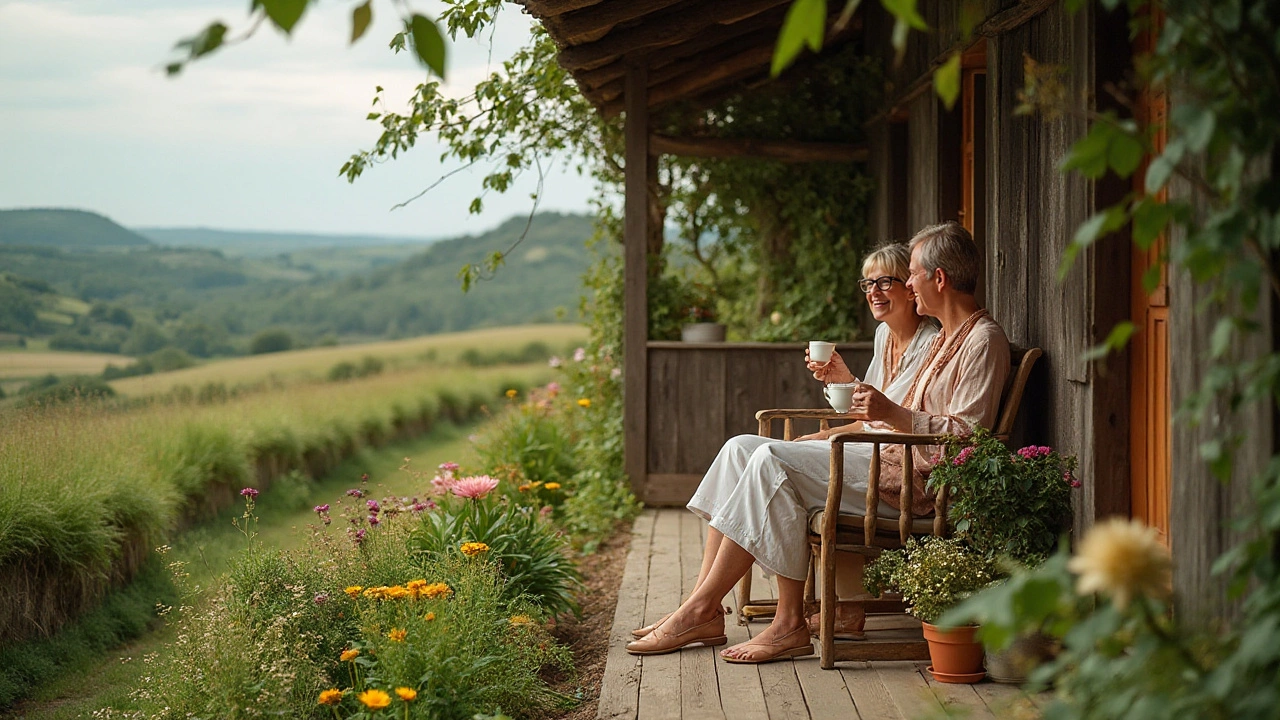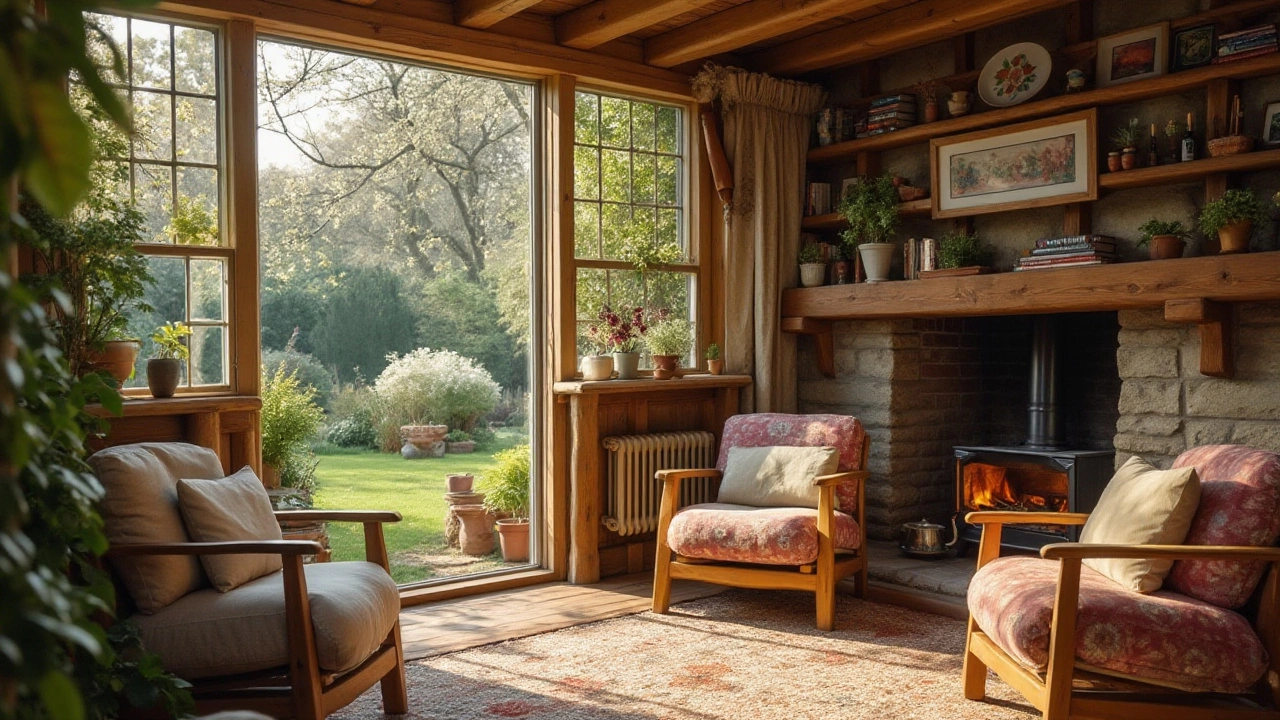Is Living in a Cottage Eco-Friendly and Worthwhile?

Imagine waking up to the gentle sound of birds chirping, nestled in the serene embrace of green surroundings and fresh air filtered through ancient trees. For many, living in a cottage represents a return to simpler times and a lifestyle more in tune with nature.
As our world becomes increasingly fast-paced and complex, the idea of retreating to a quaint, eco-friendly haven is gaining appeal. But is living in a cottage truly a good idea? Can such a lifestyle meet the demands of modern living while upholding principles of sustainability?
In this exploration, we delve into the rustic charm and potential challenges of cottage living. We’ll weigh its eco-friendly benefits, offer practical tips for transitioning to this idyllic lifestyle, and consider the profound impact it can have on personal well-being and community interaction. Whether you’re a dreamer or a realist, understanding the nuances of cottage life could inspire you to embrace this harmonious way of living.
- The Allure of Cottage Living
- Eco-Friendly Benefits of Cottage Life
- Challenges and Considerations
- Practical Tips for Cottage Dwellers
- Impact on Well-Being and Community
The Allure of Cottage Living
Living in a cottage conjures images of quaint, rustic retreats set against sweeping landscapes. It offers a compelling invitation to escape the hustle and bustle of urban life, embracing a more peaceful existence where the rhythm of life gently unfolds with the rising and setting sun. This allure is partly fueled by the serenity of natural surroundings, where mornings might include a walk through dew-laden grass and evenings are reserved for sunsets watched from a cozy porch. Cottages are often situated at the heart of nature's embrace, offering unrivaled access to forests, meadows, and streams, which serve as permanent reminders of nature’s splendor.
This connection with nature is more than aesthetic; it provides measurable benefits for the mind and body. The Journal of Environmental Psychology published a study demonstrating that immersion in nature elevates mood and boosts cognitive function. This intimate relationship with the environment often leads cottage dwellers to adopt eco-conscious habits naturally, such as composting, recycling, and using renewable resources like solar power. These practices not only benefit the planet but also create a sense of personal satisfaction and pride.
Additionally, cottages often boast eco-friendly architectural features, designed not only to blend into the landscape but to minimize environmental impact. Thick stone walls or wooden panels provide natural insulation, keeping the abode cool in summer and warm in winter, reducing energy needs. The layout often makes use of natural light, with large windows that invite the sun in and open spaces that allow air to circulate freely.
It's worth noting that engaging more closely with the natural world doesn't just benefit adults. Children, too, experience significantly positive impacts from cottage life. A 2020 study highlighted that children playing in green spaces develop better cognitive and emotional well-being. The freedom to explore and play in natural environments enhances creativity and fosters independence, crucial elements for young minds. As one cottage dweller eloquently put it in The Guardian, "A cottage isn't just a home; it's a gateway to a simpler, more profound way of life that enriches every moment, big or small."
"The simplicity of cottage life instills an unshakeable calmness that resonates long after one has left its cozy embrace." – The Guardian
The beauty of living in a cottage also lies in its inherent connection to local communities. Unlike bustling cities, where anonymity is the norm, cottages often foster a sense of belonging and community spirit. Neighbors know each other by name, and local markets brim with homegrown produce, adding richness to everyday life. This sense of community is invaluable, offering a support network and creating opportunities for friendship and collaboration.
Eco-Friendly Benefits of Cottage Life
Choosing to live in a cottage can be a transformative decision not only for the soul but also for the planet. These quaint homes are often situated in stunning natural landscapes, offering a unique opportunity to embrace eco-friendly cottages as a cornerstone of a sustainable lifestyle. With a smaller footprint than urban housing, cottages naturally promote a more conscious use of resources. Many modern cottages are designed with energy-efficient technologies and materials that reduce energy consumption, such as solar panels, green roofs, and highly insulating windows and walls. By minimizing the need for heating and cooling through clever design, residents can significantly cut down on their carbon emissions.
Moreover, the very essence of cottage living encourages an organic connection with the environment. Gardening is not just a hobby; it's practically a lifestyle staple. Whether it’s cultivating vegetables, herbs, or native plants, cottage dwellers often find joy and health in growing their own food, reducing reliance on supermarkets and their often heavily packaged goods. This not only fosters significant savings but also cuts down on fossil fuels used in transporting these goods. Additionally, composting becomes a natural extension, closing the loop on organic waste and enhancing soil quality for future crops.
Water conservation is another eco-friendly facet of living in a cottage. Many cottages are equipped with rainwater harvesting systems which collect natural precipitation for use throughout the home, from watering gardens to flushing toilets. This method not only cuts water bills but also teaches invaluable lessons in resource management that can ripple out into other areas of life. Additionally, by often relying on local resources and artisans for home goods and improvements, cottage residents inadvertently support sustainable economies and reduce their environmental impact.
It’s not just about the tangible sustainability methods, though. Living in a cottage can also reconnect individuals with a mindfulness about consumption and waste. When you’re more attuned to the rhythms of nature, making thoughtful choices becomes second nature. The slower pace fosters a thoughtful approach to the use of energy, the management of resources, and interactions with the environment. As suggested by
Emma Williamson, a sustainable living author says, "Living in harmony with nature doesn’t mean sacrificing comfort. It means redefining what comfort looks like in our modern world."The echo of her words resounds in cottages, where modernity meets an ancient respect for the earth.

Challenges and Considerations
While the idea of moving to an idyllic cottage is appealing, particularly for those aspiring to a eco-friendly lifestyle, there are several challenges and considerations that one must evaluate before taking the plunge. First, cottages are often located in rural or semi-rural areas, which might lead to isolation from the conveniences of urban living. This distance from larger communities could mean longer travel times for necessities, including groceries, healthcare, and social activities. For families, this means carefully considering access to quality education and extracurricular opportunities that might not be readily available in sparsely populated areas.
Another point to ponder is the infrastructure. Many cottages, especially the quaint, older ones, might lack modern amenities such as high-speed internet, which is becoming nearly as essential as water and electricity in today’s connected world. Updating these infrastructures can be costly and time-consuming. Additionally, some cottages were built with minimalistic heating systems, often dependent on wood stoves. Although romantic, this can be a demanding task during colder months, requiring regular stockpiling and chopping of wood.
"There's something deeply satisfying about chopping wood, it warms you twice.” said the famous writer Henry Ford, and while this adds a rustic charm, it also signifies the time and effort required for daily chores.
Environmental factors can present another significant challenge. Even with an interest in green living, maintaining a cottage demands an understanding of its ecological surroundings. Many cottages are nestled near forests or water bodies, which necessitates precautions for fire safety during dry seasons and measures to prevent flooding during rains. This also extends to ecological preservation; the lifestyle embraces the use of sustainable resources and minimal impact living, which requires a committed change in personal consumer habits. Switching to solar power, installing rainwater collectors, and setting up a compost system are just a few examples.
The financial considerations aren’t to be taken lightly either. While the purchase prices might be appealing compared to urban properties, maintenance and unexpected repairs can pose significant long-term costs. Older structures might need frequent upkeep due to their age and susceptibility to harsh weather conditions. Buyers should consider conducting thorough inspections and budgeting for potential renovations or energy efficiency upgrades, which are essential for reducing the environmental footprint.
Lastly, it’s vital to consider the impact of social engagement and proximity. While cottage living offers a reprieve from bustling city life, it also means fewer immediate community interactions. Engaging with local communities often requires initiative, as social networks may not be as expansive as city dwellings. However, this could lead to more meaningful relationships, sparking a close-knit community feel that modern urban environments sometimes lack.
Practical Tips for Cottage Dwellers
Embracing the cottage lifestyle requires more than just moving boxes from a bustling urban setting to a quaint rural abode. Success in transition depends on a mindful approach that celebrates sustainability and minimalism while acknowledging the modern inconveniences that may surface. One of the foremost pieces of advice is to prioritize building a strong relationship with natural surroundings. This encompasses understanding local flora and fauna, which can enrich your life with opportunities for gardening, wildlife watching, and even foraging, depending on your geography. Living in a cottage often teaches that the bounty of nature offers both beauty and resources, encouraging residents to adopt practices respectful to the environment.
Crafting a self-sufficient lifestyle can be profoundly rewarding in terms of both ecological footprint and personal satisfaction. You might consider setting up a rainwater collection system; not only can this reduce water bills, but it also highlights the importance of water conservation. Similarly, experimenting with energy sources like solar panels can pave the way for a greener future. For those new to the DIY spirit, joining a local workshop or community group can be an excellent way to gain hands-on experience and tap into a network of like-minded individuals. Tools and knowledge exchanges often enrich the community of cottage dwellers, serving as a reminder that life in a cottage is as much about communal growth as it is about personal discovery.
Maintaining the equilibrium between eco-friendly aspirations and daily necessities is crucial. Many find that composting studios are efficient ways to manage household waste, converting what might otherwise be garbage into rich soil for gardens. Reflect on your consumer habits too; locally sourcing food and goods not only supports nearby farmers and artisans but also cuts down on the carbon footprint associated with transporting goods over long distances. A thoughtfully curated environment—both inside and outside your cottage—can have lasting impacts on your happiness and stress levels in this serene setting.
Balancing modern connectivity with the tranquility of a cottage lifestyle is a challenge worth mastering. Solutions like satellite internet services are becoming increasingly accessible, offering reliable connectivity without disrupting the peaceful ambiance of rural living. This balance enables work-from-home professionals or digital nomads to thrive while savoring the benefits of a natural environment. That said, unplugging from technology intermittently can help maintain the serenity that attracted you to cottage life in the first place. Establishing dedicated tech-free time each day recharges the mind and nurtures a deeper connection with the picturesque landscape around you.
"Living in a cottage teaches you to live in rhythm with nature, not against it," notes Leo Buscaglia, a renowned advocate of simple living.
Finally, recognize the importance of regular maintenance for your charming abode. Though antiques and vintage elements bring unmistakable charm, they might also require occasional upkeep. Keep an eye on structural integrity, wood integrity, and weatherproofing to ensure your haven remains a cozy retreat regardless of the season. A small investment of time in maintenance today can save substantial repairs down the road. As an informed and proactive dweller, prepare yourself for seasonal changes and practically manage the unique challenges of weather in your area. Every small effort amalgamates into a rewarding eco-friendly journey, making cottage living not just a viable option—but an enriching one.

Impact on Well-Being and Community
Living in a cottage can significantly enhance one's well-being by nurturing a deeper connection with nature and fostering a sense of tranquility that urban environments struggle to provide. The timeless charm of cottage life not only offers a chance to live sustainably but also revitalizes the mind and body, creating a sanctuary from the chaotic hustle of city life. Here, the rhythm of life slows down, and each day unfolds with a new sense of purpose tied closely to the natural world. Studies have shown that exposure to greenery and nature can reduce stress levels, lower blood pressure, and improve mental health. With the lack of noise pollution and the presence of natural sounds, cottage dwellers often find themselves more at peace.
Another significant influence of cottage lifestyle is its effect on community dynamics. Cottages are often part of close-knit communities where residents look out for one another, sharing resources and participating in local activities. This communal spirit becomes a vital part of daily life, encouraging interactions that are enriching and supportive. With a community-oriented mindset, individuals often engage in sustainability efforts, such as group gardening, clean-up drives, and energy-sharing cooperatives. According to research published in the Journal of Environmental Psychology, a sense of community positively correlates with higher life satisfaction and happiness.
John Muir once said, "In every walk with nature, one receives far more than he seeks." This sentiment captures the spirit of green living in a cottage, where simplicity and natural beauty resonate deeply with those who choose this path.
Integrating into a cottage community also provides opportunities to learn traditional skills, from woodworking to homemade crafts, which are both practical and fulfilling. These activities offer numerous psychological benefits, enabling individuals to enter states of flow that foster creativity and relaxation. Additionally, these skills foster independence and self-reliance, reducing one's reliance on mass-produced goods and promoting eco-friendly practices. Moreover, participating in community activities cultivates friendships and builds networks that can significantly improve one's sense of belonging and purpose.
Environmentally, cottages often inspire a green living approach by necessity. Many cottage communities are self-sufficient, relying on solar energy, rainwater catchment systems, and sustainable waste management techniques. A 2021 survey by the Green Building Council found that residents in sustainable housing report higher satisfaction with their quality of life, attributing it to their reduced ecological footprint. Living in harmony with nature encourages a mindful approach to consumption where the focus shifts from excess to necessity.
Traditionally, cottages are also ideal for fostering intergenerational relationships, as they provide a setting conducive to storytelling and knowledge sharing across ages. Here, grandparents can teach their grandchildren traditional crafts, while children instill a youthful enthusiasm and relish the joys of a life less filled with screens. These interactions enrich the lives of both young and old, creating a tapestry of shared experiences. Thus, a move to a cottage can be as much about the physical setting as it is about fostering a thriving, supportive, and meaningful community life that benefits everyone.